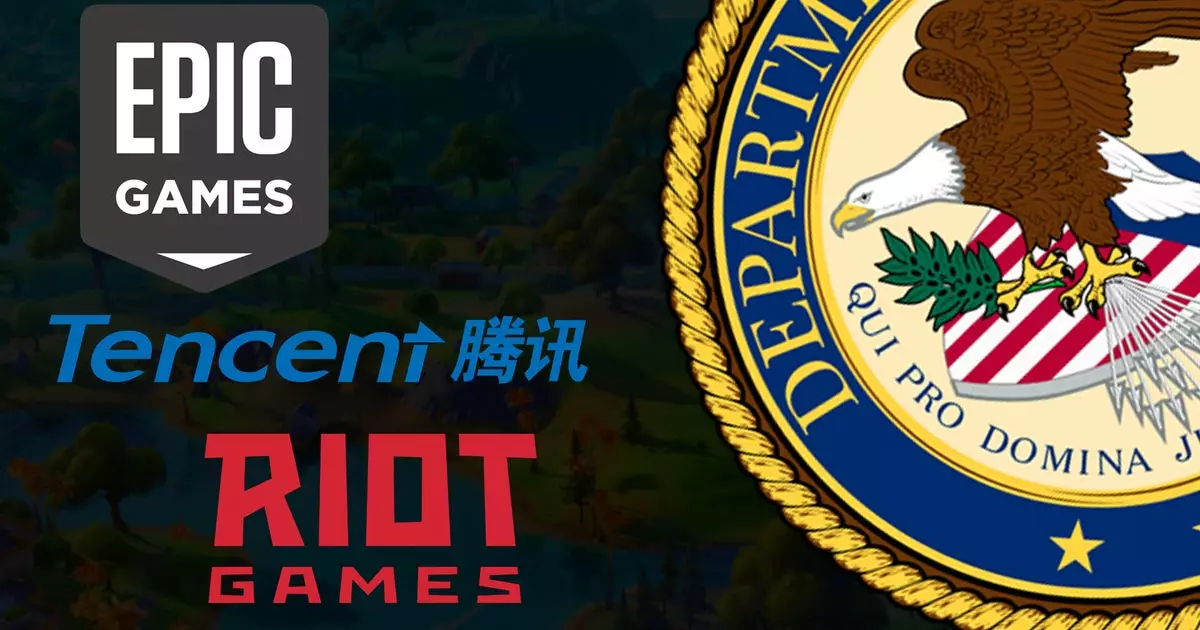The recent developments involving Epic Games underscore the vital role of antitrust laws in regulating corporate behavior, particularly within industries marked by fierce competition and complex ownership structures. Two directors from Epic’s board have resigned amid a Department of Justice (DoJ) investigation into potential antitrust violations, igniting a firestorm of discussion about corporate governance and the intertwining relationships among gaming companies. The resignations of Ben Feder and David Wallerstein, both affiliated with Tencent, highlight the precarious balance companies must maintain to avoid conflicts of interest that could lead to monopolistic power.
The situation has drawn scrutiny towards Tencent, a giant in the global gaming landscape, which holds a minority stake in Epic Games while fully owning Riot Games, a competitor. Such entangled relationships can create a potential conflict of interest, reminiscent of letting a high-ranking executive from Coca-Cola attend strategy meetings at PepsiCo. This cross-contamination of interests not only poses severe business ethical issues but also threatens fair competition in the gaming industry.
This scenario unfolds under the purview of the Clayton Act, a pivotal piece of legislation designed to curb anti-competitive behaviors. The Act clearly delineates restrictions on individuals serving on the boards of competing firms, aiming to preserve market integrity by preventing any single entity from amassing disproportionate control. By prohibiting board members from holding positions simultaneously at rival companies, the law seeks to foster a competitive environment where innovation thrives without the shadow of monopolistic practices.
The primary concern that prompted the DoJ’s intervention is the potential for shared strategic information and decision-making influence that could undermine competition. As businesses vie for dominance in a rapidly evolving market, it becomes increasingly critical for regulatory bodies to intervene when they suspect the legality of corporate arrangements.
Following the investigation, neither Epic nor Tencent readily admitted to any wrongdoing. However, they swiftly took corrective measures to align themselves with legal expectations. Tencent agreed to amend its shareholder agreement with Epic, effectively barring it from appointing directors to the Epic board in the future. This strategic adjustment reflects a growing awareness within the corporate sector of the stringent scrutiny applied by regulatory bodies, especially in the tech-savvy gaming industry, which has seen explosive growth in recent years.
The resignations of Feder and Wallerstein serve not only as a response to legal pressures but also as an acknowledgment of the need for clearer delineation of governance structures within gaming companies. It establishes a precedent that corporate entities must engage their governance frameworks critically to ensure compliance, thereby prioritizing ethical conduct.
The reverberations of these events extend beyond Epic Games and Tencent. Antitrust scrutiny is likely to become more prevalent across the gaming industry, spurred by previous high-profile cases such as the legal challenges faced by Valve and the heightened investigation surrounding Microsoft’s acquisition of Activision Blizzard.
As the gaming sector becomes increasingly consolidated, the regulatory landscape may evolve in responsiveness to the interdependencies and potential conflicts of interest that arise. Companies within the sector must brace for a scenario where they are compelled to reassess their governance practices and stakeholder relationships to avert the looming specter of antitrust investigations.
In a market defined by rapid innovation and shifting consumer preferences, maintaining compliance with antitrust regulations will be paramount for companies aiming to secure competitive advantage without risking regulatory scrutiny. It raises the question—can innovation thrive amid stringent regulations, or will such measures stifle creativity and market fluidity?
The resignation of directors from Epic Games is a sobering reminder of the intricate relationship between corporate governance and antitrust laws. Robust regulatory frameworks are essential to ensure a balanced competitive landscape within the gaming industry. As market dynamics evolve, companies must remain vigilant about their governance practices, mindful that they operate within the boundaries set by law and that ethical conduct is more than a mere compliance checklist—it’s essential for sustainable growth and innovation. The future of the gaming industry may very well rely on such vigilance as it navigates the complexities of competition in an increasingly interconnected world.

